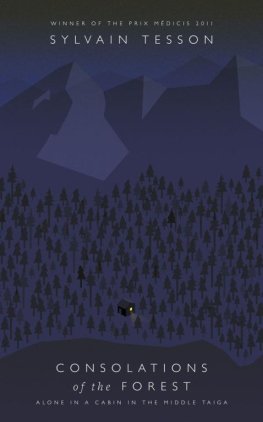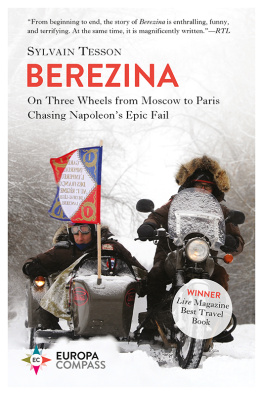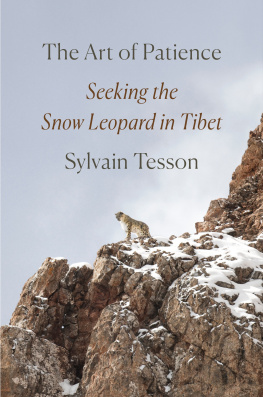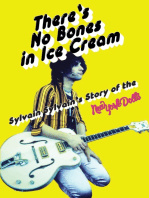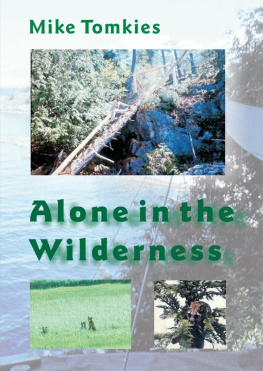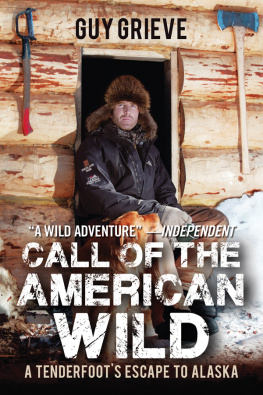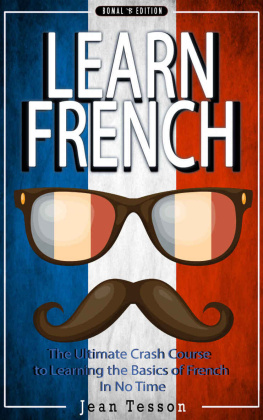Sylvain Tesson
CONSOLATIONS OF THE FOREST
Alone in a Cabin in the Middle Taiga
Translated from the French by Linda Coverdale
For I belong to the forests and solitude.
KNUT HAMSUN
PanFreedom is always available. One need only pay the price for it.
HENRY DE MONTHERLANT
Cahiers, 1957
Id promised myself that before I turned forty I would live as a hermit deep in the woods.
I went to spend six months in a Siberian cabin on the shores of Lake Baikal, on the tip of North Cedar Cape. Seventy-five miles from the nearest village, no neighbours, no access roads and every now and then, a visit. Wintertime temperatures in the minus twenties Fahrenheit; the summer brought bears out into the open. In short: paradise.
I took along books, cigars and vodka. The rest space silence and solitude was already there.
In that desert, I created a beautiful and temperate life for myself, experiencing an existence centred on simple gestures. Between the lake and the forest, I watched the days go by. I cut wood, fished for my dinner, read a lot, hiked in the mountains, and drank vodka, at my window. The cabin was an ideal observation post from which to witness natures every move.
I knew winter and spring, happiness, despair, and in the end, peace.
In the depths of the taiga, I changed myself completely. Staying put brought me what I could no longer find on any journey. The genius loci helped me to tame time. My hermitage became the laboratory of these transformations.
Every day I recorded my thoughts in a notebook.
This is the journal of a hermits life.
S. T.The Heinz company sells around fifteen kinds of tomato sauce. The supermarket in Irkutsk stocks them all and I dont know which to choose. Ive already filled six carts with dried pasta and Tabasco. The blue truck is waiting for me; its 26F outside and Misha, the driver, keeps the engine running. Tomorrow we leave Irkutsk and in three days will reach the cabin, on the western shore of the lake. I must finish my shopping today. I decide on Heinz Super Hot Tapas. I buy eighteen bottles: three per month.
Fifteen kinds of ketchup. Thats the sort of thing that made me want to withdraw from this world.
9 FEBRUARY
Im stretched out on my bed in Ninas house on Proletariat Street. I like Russian street names. In the villages youll find a Labour Street, an October Revolution Street, a Partisans Street, and sometimes an Enthusiasm Street, along which trudge grey-haired Slav grannies.
Nina is the best landlady in Irkutsk. A former pianist, she used to play in the concert halls of the Soviet Union. Now she runs a guest house. Yesterday she told me: Whod ever have thought Id wind up cranking out pancakes? Ninas cat is purring on my stomach. If I were a cat, I know whose tummy Id snuggle on.
Im poised on the threshold of a seven-year-old dream. In 2003 I stayed for the first time at Lake Baikal. Walking along the shore, I discovered cabins at regular intervals, inhabited by strangely happy recluses. The idea of going to ground alone in the forest, surrounded by silence, began to intrigue me. Seven years later, here I am.
I must find the strength to push the cat off. Getting up from a bed requires amazing energy. Especially when its to change a life. This longing to retreat just at the point of achieving your hearts desire Certain men do an about-face at the crucial moment. Im afraid I might be one of them.
Mishas truck is packed to the point of bursting. Its a five-hour drive to the lake across frozen steppes, navigating over petrified wave crests and troughs. Villages smoke at the foot of hills, wreathed in mists trapped in the shallows. Faced with visions like these, the Suprematist painter Kazimir Malevich wrote: Whoever has crossed Siberia can never again aspire to happiness. At the top of a ridge, there it is: the lake. We stop to have a drink. After four brimming glasses of vodka, we wonder: how in the world does the shoreline manage to follow the water so perfectly?
Lets get the statistics out of the way. Baikal: 435 miles long, 50 miles wide, almost a mile deep. Twenty-five million years old. The winter ice is over three and a half feet thick. Beaming its love down upon the white surface, the sun doesnt give a damn about such things. Filtered by clouds, patches of sunshine slide in a gleaming herd across the snow, brightening its cadaverous cheeks.
The truck ventures out onto the ice. Beneath the wheels, its two-thirds of a mile down. If the truck plunges through a fissure, it will topple into a black abyss. The bodies will sink in silence. Slow snowfall of the drowned. The lake is a godsend for anyone who dreads decay. James Dean wanted to die and leave a beautiful corpse. The tiny copepods called Epischura baikalensis will clean the bodies within twenty-four hours, leaving only ivory bones on the lake bed.
10 FEBRUARY
We spent the night in the village of Khuzhir on Olkhon Island, pronounced Olkrhone, Nordic style, and were heading north. Misha isnt a talker. I admire people who keep quiet; I imagine their thoughts.
Im on my way to the place of my dreams. Outside, the atmosphere is bleak. The cold has let its hair down in the wind; wisps of snow skitter away from our wheels. The storm wedges itself into the cleft between sky and ice. I study the shore, trying not to think about living for six months in the requiem mass of those forests. All the ingredients of the imagery of Siberian deportation are there: the vastness, the livid cast of the light. The ice rather resembles a shroud. Innocent people were dumped for twenty-five years into this nightmare, whereas I will be living here by choice. Why should I complain?
Misha: Its dreary.
And nothing more until the next day.
Constructed in the 1980s as a geologists hut, my cabin is off in a clearing of the cedar forest in the northern sector of the Baikal-Lena Nature Reserve. My new neighbourhood is named after these trees: North Cedar Cape. It sounds like an old peoples home. And after all, I am going on a retreat.
Driving on a lake is a transgression. Only gods and spiders walk on water. Three times in my life Ive felt I was breaking a taboo. The first was when I contemplated the dry bed of the once mighty Aral Sea, emptied by man. The second was when I read a womans private diary. The third was driving over the waters of Baikal. Each time, the feeling of tearing aside a veil. The eye spying through the keyhole.
I explain this to Misha. And get no reply.
Tonight we stay at the weather station of Pokoyniki, in the heart of the reserve.
Sergei and Natasha run the station. Theyre as beautiful as Greek gods, but wearing more clothes. Theyve been living here for twenty years, tracking down poachers. My cabin is thirty-one miles to the north of their home, and Im glad to have them as neighbours. Ill find pleasure in thinking about them. Their love: an island in the Siberian winter.
We spend the evening with two of their friends, Sasha and Yura, Siberian fishermen who embody two Dostoyevskian character types. Sasha is hypertensive, with a florid face, full of vitality. He has the eyes of a Mongol, and a deep, steely gaze. Yura is sombre, Rasputinian, an eater of bottom-feeding fish. Hes as pale as the denizens of Tolkiens Mordor. Sasha is made for great feats, impulsive action, while Yura is a born conspirator. He hasnt set foot in a city in fifteen years.
11 FEBRUARY
In the morning we take to the ice again. The forest streams past. When I was twelve my family went to see the Mmorial de Verdun, a museum dedicated to the Great War. I remember the Chemin des Dames hall, commemorating a trench where soldiers and their rifles had been engulfed by a flood of mud. The forest this morning is a buried army, of which nothing shows but its bayonets.

